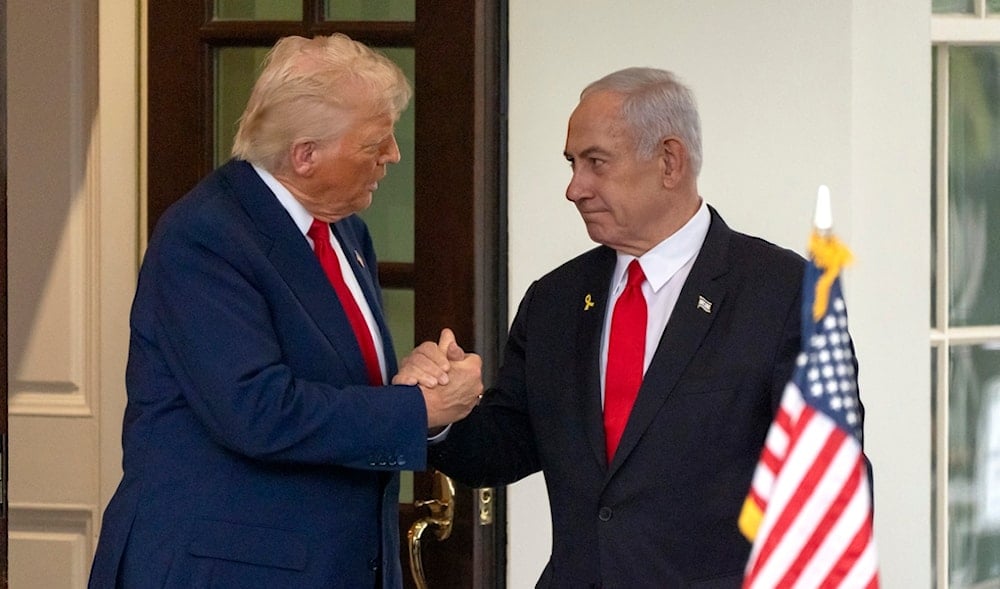Pentagon split over 'Israel' military aid exposes foreign policy rift
A Pentagon rift over military aid to "Israel" reveals tensions between advocates of Middle East engagement and those prioritizing Asia, shaping Trump’s foreign policy.
-

US President Donald Trump, left, shakes hands with Israeli Prime Minister Benjamin Netanyahu as he leaves the West Wing of the White House, Monday, April 7, 2025, in Washington (AP)
Top Pentagon officials are split over the extent of US military backing for "Israel", a division poised to influence President Donald Trump’s second-term foreign policy direction, Ben Smith, founder of news website Semafor, wrote in a recent exclusive publication.
General Michael Kurilla, chief of US Central Command, has advocated for increased resources to defend "Israel" amid growing Iranian retaliation. In contrast, Undersecretary of Defense for Policy Elbridge Colby, a key proponent of the "restrainer" movement, has opposed diverting US military assets from Asia to the Middle East.
The Iran war embodies the core tension for Colby and his allies: the US has long aimed to fulfill the "pivot to Asia" strategy first announced by Barack Obama in 2011, but practical demands and political pressures continually refocus US military engagement on the Middle East.
Shifting priorities within the Pentagon
According to Smith, Colby’s opposition stems from concern that Middle East deployments, such as the April relocation of a Patriot missile battery from South Korea, could impair US readiness in future conflicts with China or North Korea. Trump, despite aiding "Israel" militarily, has at times bristled at overt coordination, allegedly dismissing National Security Adviser Mike Waltz partly due to his close ties with Israeli Prime Minister Benjamin Netanyahu.
Trump’s appointment of Colby sparked concern among pro-Israeli hawks, who interpreted it as a possible shift toward reduced US support. The dismissal of Waltz and Trump’s allowance for "Israel" to strike Iran "independently" further suggested a hands-off approach. However, Colby’s influence appears to be waning.
It is worth noting that the US was informed of the strikes on Iran, and despite claiming it is not involved in the assault, Iran stressed that the attacks were carried out with the American green light. Trump also repeatedly threatened Iran and vowed to defend "Israel".
Kurilla gains ground
Secretary of Defense Pete Hegseth reportedly purged several of Colby’s allies in April, aligning more closely with Kurilla. The Free Press’s Eli Lake reported that the new Deputy Assistant Secretary of Defense for the Middle East, Michael Dimino, also from the "restrainer" camp, has raised alarm among Trump loyalists who believe Middle East engagement remains vital.
“You have a guy who is going to be the deputy for Middle East policy who doesn’t think the United States should be in the Middle East. Somebody should call Elon at DOGE,” one Trump ally quipped.
Earlier this month, Al-Monitor reported Kurilla had requested a second aircraft carrier strike group be deployed to the region. Though the Pentagon has not confirmed the deployment, the US has begun moving warships and aircraft into the area. A scheduled visit by the USS Nimitz to Vietnam was abruptly canceled due to “emergent operational requirements.”
The future of American policy
A key force behind the "restrainer" ideology is Defense Priorities, a group funded by Charles Koch’s Stand Together. The organization recently issued a nuanced position advocating reduced Israeli dependency on US military guarantees: “A more secure, diplomatically connected Israel would rely less on American military support and more on regional partnerships to ensure its future.”
Colby and the Pentagon’s press office did not respond to media inquiries, but internal dynamics suggest a growing advantage for those favoring traditional US involvement in the Middle East. As Trump balances his “America First” ethos with regional alliances, the outcome of this internal debate will shape the trajectory of US-Israeli relations in a time of regional volatility.
Read more: 'Major schism' in Trump coalition amid Iran-'Israel' escalation

 4 Min Read
4 Min Read










